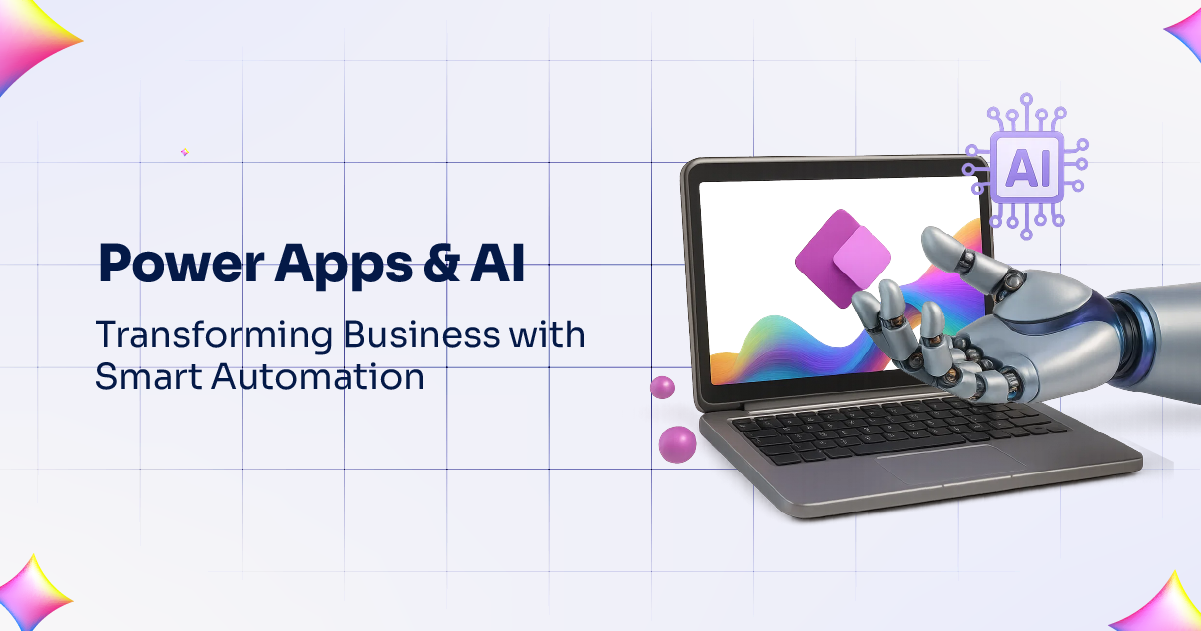
In today’s fast-paced business environment, companies are constantly looking for ways to enhance efficiency, improve decision-making, and reduce costs. One of the most effective ways to achieve these goals is through smart automation. As technology evolves, tools like Microsoft Power Apps and artificial intelligence (AI) are revolutionizing the way businesses operate. With these tools, organizations can automate processes, streamline workflows, and empower employees to solve problems without requiring deep technical knowledge. In this blog, we will explore how Microsoft Power Apps combined with AI is changing the business landscape, transforming operations, and enabling smarter automation.
What is Microsoft Power Apps?
Microsoft Power Apps is a suite of applications, connectors, and a data platform that allows users to quickly build custom apps with little to no code. Whether you want to create a simple application for internal use or develop a complex solution, Power Apps enables businesses to address their unique needs without relying on traditional development cycles. By using a visual interface, business users—also known as “citizen developers”—can create and modify apps quickly, ensuring that they can meet the dynamic demands of their organizations.
With Power Apps, businesses can design apps for various purposes, such as automating workflows, managing inventory, tracking customer interactions, and much more. The integration with Microsoft 365 and other Microsoft services makes it an ideal choice for companies already leveraging these platforms. Power Apps brings the power of custom applications to all users, regardless of their technical skill level, empowering them to contribute to the business’s digital transformation efforts.
The Role of AI in Power Apps
Artificial intelligence (AI) has long been a buzzword in the business world, but its practical applications are increasingly becoming a reality. When integrated into Power Apps, AI allows businesses to automate even more complex tasks, gain deeper insights into data, and improve user experience.
Here’s how AI is transforming business processes through Power Apps:
1. Enhanced Decision Making with AI-Driven Insights
One of the most significant benefits of integrating AI into Microsoft Power Apps is the ability to analyze large volumes of data and generate actionable insights. Power Apps leverages AI models, such as Microsoft’s Azure AI, to analyze historical data, detect trends, and provide predictive insights. This empowers businesses to make data-driven decisions faster, reducing the reliance on human judgment alone.
For example, in a sales application built using Power Apps, AI can analyze past sales data to predict future sales trends. This can help sales teams better understand their targets and adjust strategies accordingly, leading to improved outcomes.
2. Automated Data Processing with AI
AI-powered automation in Power Apps goes beyond simple task automation. By incorporating AI, businesses can automate complex workflows, such as processing invoices, identifying fraud patterns, or even detecting anomalies in customer behavior. This reduces the time spent on repetitive tasks, allowing employees to focus on more strategic work.
Imagine an HR department using Power Apps to automatically process employee requests for time off. AI can verify the data, check the remaining balance of leave days, and even ensure that the approval process follows company policies. All of this can happen with minimal human involvement, ensuring a faster and more accurate process.
3. Natural Language Processing (NLP) for Enhanced Interaction
With AI-powered Natural Language Processing (NLP), Power Apps enables users to interact with apps in a more intuitive and natural way. Users can input commands or queries in plain language, and the app can process and respond to these inputs effectively. This capability makes Power Apps even more accessible to non-technical users.
For instance, a customer service app developed in Power Apps could allow agents to ask questions or request data using simple phrases. Instead of manually searching through various systems, the AI can pull the relevant information and present it to the user. This makes the workflow more efficient and enhances the user experience.
4. AI-Powered Chatbots for Customer Interaction
Incorporating AI-driven chatbots within Power Apps can revolutionize how businesses interact with customers. Chatbots can automate customer service, resolve issues, and even assist in lead generation. With AI capabilities, these chatbots can provide personalized responses, learning from each interaction to improve over time.
For instance, a retail business could deploy an AI chatbot built with Power Apps to handle customer inquiries about product availability, order status, and delivery details. The chatbot could provide 24/7 support, reducing the need for human intervention and improving customer satisfaction.
The Future of AI and Microsoft Power Apps
The potential of combining Microsoft Power Apps with AI is vast. As AI technology continues to evolve, we can expect even more sophisticated applications, with advanced machine learning and cognitive services becoming a standard part of Power Apps. Businesses will be able to develop even more powerful and intelligent applications, further automating complex workflows and enhancing decision-making capabilities.
In the coming years, Microsoft plans to enhance Power Apps’ integration with AI tools, making it easier for businesses to embed intelligent automation directly into their apps. Additionally, Microsoft’s ongoing improvements to the AI models and frameworks available through Azure will offer businesses even more opportunities to leverage cutting-edge technology in their everyday operations.
Why Microsoft Power Apps Is a Game Changer for Business
- Cost Efficiency: Microsoft Power Apps eliminates the need for extensive coding or expensive custom development. This allows businesses to rapidly build and deploy applications, reducing overall development costs.
- Agility: With Power Apps, businesses can quickly respond to changing market conditions by creating and modifying apps without long development cycles. This adaptability is critical for staying competitive in today’s market.
- Empowerment of Employees: By enabling non-developers to create custom solutions, Power Apps fosters a culture of innovation across all levels of the organization. Employees can build solutions tailored to their specific needs, leading to increased productivity and satisfaction.
- Seamless Integration with Microsoft 365: Since Power Apps is part of the Microsoft ecosystem, businesses that already use Microsoft 365 will benefit from seamless integration with their existing tools and data.
Conclusion
Microsoft Power Apps and AI are redefining how businesses automate tasks, make decisions, and interact with customers. With the power of AI-driven automation, companies can optimize their processes, improve efficiency, and enhance the overall customer experience. As businesses continue to embrace the potential of these technologies, the future of work will become increasingly reliant on intelligent, automated solutions that drive smarter business practices.
To learn more about the power of Microsoft Power Apps and how it can enhance your business, check out our comprehensive guide on Microsoft 365 Managed Services.
Stay ahead of the curve by exploring how smart automation through Power Apps and AI can unlock new possibilities for your business!
